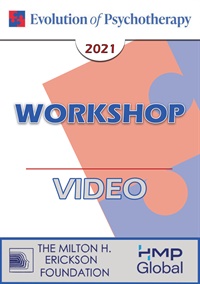EP21 Workshop 16 - Working with Trauma in Couples Therapy - Ellyn Bader, PhD
- Average Rating:
- Not yet rated
- Topic Areas:
- Workshops | Family Systems | Social Psychology | Therapist Techniques
- Categories:
- Evolution of Psychotherapy | Evolution of Psychotherapy 2021 | Pioneers in Couples and Family Therapy
- Faculty:
- Ellyn Bader, PhD
- Course Levels:
- Master Degree or Higher in Health-Related Field
- Duration:
- 2 hours
- Format:
- Audio and Video
- Original Program Date:
- Dec 03, 2021
- License:
- Never Expires.
Description
Description: Ellyn Bader presents her developmental model for couples therapy, focusing on treating trauma through structured communication techniques. She demonstrates how therapists can help couples overcome developmental challenges, build self-differentiation, and heal from various traumatic experiences using the initiator-inquirer method. The approach supports emotional growth, empathy, and rebuilding intimacy by guiding partners to understand themselves and each other more deeply.
Syllabus Description: Clients coming for Couples Therapy have often been impacted by early developmental trauma, systemic or intergenerational trauma, or acute interpersonal trauma. Partners with early developmental trauma or acute trauma at young ages are complex to work with and take patience, and persistence from the therapist to recognize moments of exposure and self-expression in order to develop a stronger sense of self. Yet, couples therapy can be a very powerful form of therapy for alleviating shame and developing a much stronger and more integrated sense of self.
Learning Objectives
- Describe 5 types of trauma that may impact couples coming for therapy.
- Delineate 2 developmental capacities that effect couples functioning.
- Utilize clinical examples to show how an attuned couples therapist can facilitate partners developing a stronger more integrated sense of self.
Credits
Handouts
| Timestamped Transcript (1.3 MB) | 33 Pages | Available after Purchase |
| Ericksonian Learning Snapshot (248.6 KB) | 2 Pages | Available after Purchase |
Faculty

Ellyn Bader, PhD Related Seminars and Products
Ellyn Bader, PhD, is a founder and director of The Couples Institute in Menlo Park, California. As a clinical psychologist, workshop leader, author, and speaker, she is dedicated to helping couples create extraordinary relationships. Over the past 30 years she has trained therapists in couples therapy throughout the United States as well as Europe, Asia, South America, and Australia. She served as a Clinical Faculty in Stanford University School of Medicine for 8 years.


